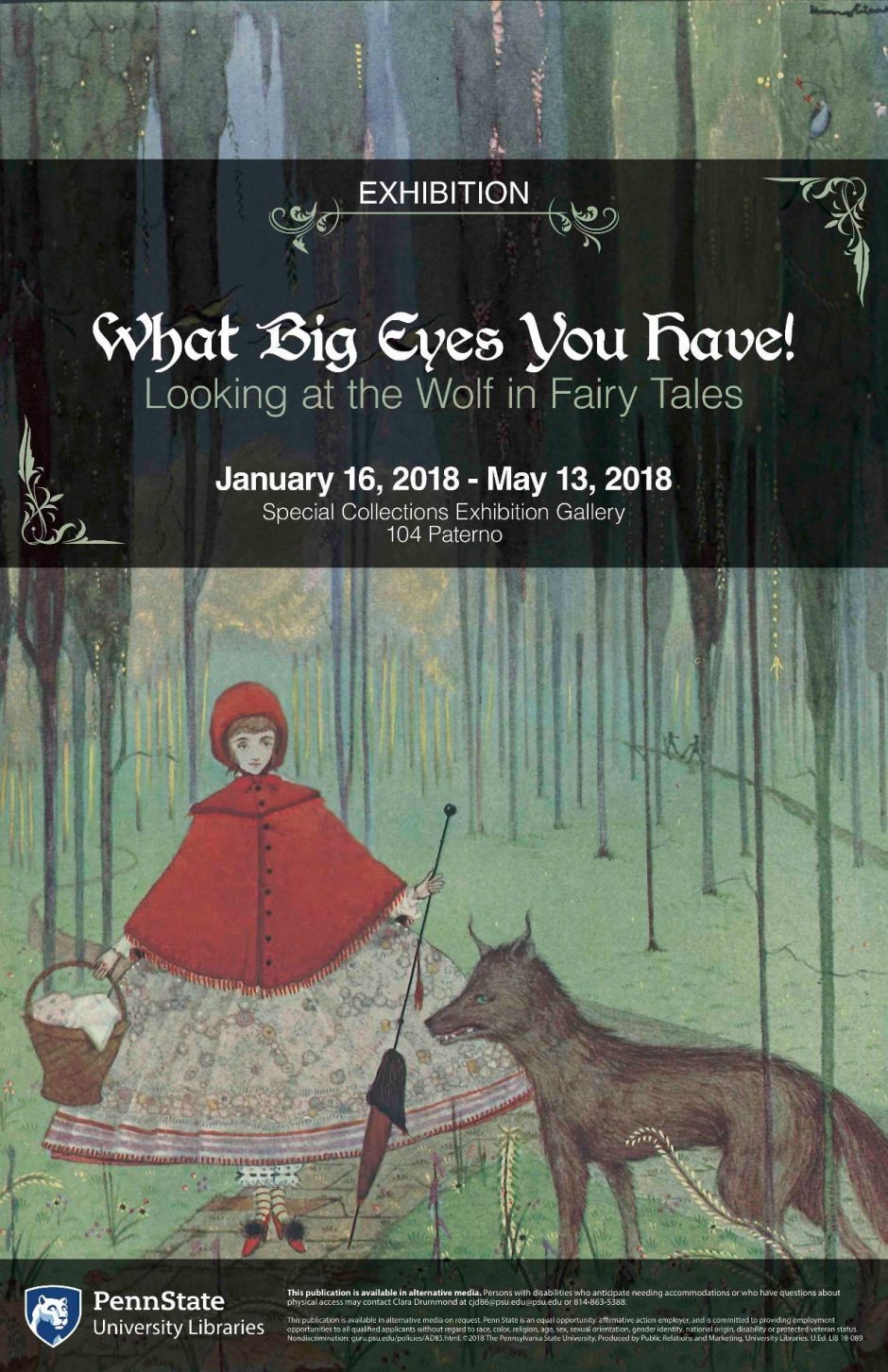Spring 2018
Academic calendar information for all campuses is available online.

Jan. 16–Aug. 26, “What Big Eyes You Have! Looking at the Wolf in Fairy Tales”exhibition, Eberly Family Special Collections Library Exhibition Room, 104 Paterno Library.

Feb. 18-Aug. 13, “Depth of Field” exhibit, Diversity Studies Room, 203 Pattee Library, seeks to highlight the intersections of war in the Middle East with the history of war photography.
Monday, Apr. 2: Edible Book Festival – Compete in or help judge a book-themed cake decorating contest. Sign up at http://tinyurl.com/psulibsediblebook, noon- 1p.m., Mann Assembly Room, 103 Paterno Library.
Monday 2 April: Editing Aphra Behn in the Digital Age (E-ABIDA) – Show-and-tell session with some of our special collections related to Aphra Behn, with Elaine Hobby and Claire Bowditch of Loughborough University, England. 5-6 p.m., Mann Assembly Room, 103 Paterno Library.
Tuesday, Apr. 3: Grant Writing Workshop, Mann Assembly Room, 103 Paterno Library, 1-2:30 p.m.
Tuesday, April 3: Editing and Collating 17th Century Books in the Modern Digital Age – with Elaine Hobby and Claire Bowditch of Loughborough University. 2-3 p.m., Foster Auditorium and live streamed via MediaSite.
Tuesday, Apr. 3: Jillian Cantor to read as part of the Mary E Rolling Reading Series, Foster Auditorium, 102 Paterno Library, 7:30-9 p.m.
Wednesday, Apr. 4: Software in the Humanities and Social Sciences Workshop – IIIF, with Karen Estlund. Bring a bag lunch; noon-1 p.m. 403 Paterno Library and via Zoom at https://psu.zoom.us/j/914950827.
Thursday, Apr. 5: Lecture by Professor Leo Bersani, “Force in Progress”, 5-7 p.m., Foster Auditorium, 102 Paterno Library.
Friday, Apr. 6: Art+Feminism Wiki-edit-a-thon – An editing free-for-all to improve content on feminism, gender, and the arts on Wikipedia, 10 a.m.-5 p.m., Mann Assembly Room, 103 Paterno Library. Remote participation is also encouraged; This year’s meetup page is: https://en.wikipedia.org/wiki/Wikipedia:Meetup/University_Park/ArtAndFeminism_2018/The_Pennsylvania_State_University.
Wednesday, Apr. 11: Software in the Humanities and Social Sciences Workshop – OpenRefine, a free and open-source resource for cleaning, regularizing, and organizing complex data, with Jose Guerrero. Bring a bag lunch; noon-1 p.m. 403 Paterno Library and via Zoom at https://psu.zoom.us/j/914950827.
Sunday, Apr. 22: International Write-In. Two sessions, 3:30-7:30 p.m. and 8 p.m.-midnight. Mann Assembly Room, 103 Paterno Library. Interested writers can sign up today at: http://tinyurl.com/psuwritein
Monday, Apr. 23: Working with International Students Workshop: Resources and Inclusive Strategies, 1-4 p.m., 221 Chambers Building, Krause Learning Space.
Please submit event information — and all Library News submissions — to Public Relations and Marketing via the Library News submission form. *Please note: The content submissions process may be changing soon; please stay tuned for updates.*




